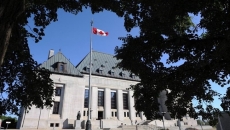VICTORIA - People or companies in British Columbia will need to explain how they obtained their cash, fancy homes, cars and luxury goods if there's a suspicion they came from criminal activity.
The provincial government has tabled changes to its Civil Forfeiture Act that would allow for the creation of unexplained wealth orders to help prevent money laundering by those who hide their assets in goods or through family members or associates.
If there is reason to suspect property was used in or acquired through crime or the person doesn't appear to have sufficient income to own what they have, a B.C. Supreme Court judge could require them to explain their income sources.
Public Safety Minister Mike Farnworth said Thursday organized crime and money laundering techniques have become increasingly sophisticated, so the province has to become more agile.
"Too many people are recruited into organized crime with dreams of exotic cars, fancy homes and glamorous lifestyle. It is anything but," he said.
"However, today's amendments will make it more difficult for criminals to bank on their illicit assets."
We’re cracking down on organized crime through a new suite of tools to seize proceeds of crime, like luxury cars and homes. This approach is making gang life less attractive, sending a clear message to organized crime & building safer communities for everyone
— Mike Farnworth (@mikefarnworthbc) March 30, 2023
The amendments will allow the provincial civil forfeiture office to look for assets hidden in the names of trustees of a trust, companies, partnerships and even family members.
"Just because the mob boss's spouse isn't involved in illegal activity, doesn't mean they get to keep the house," Farnworth said.
Those targeted by the orders must hold assets in B.C. worth $75,000 or more and could include "politically exposed" foreigners such as members of a legislature, high-ranking military officers or heads of government agencies.
The unexplained wealth orders alone are not orders to forfeit property, but information gathered could be used in later civil court proceedings, the government says.
Similar laws exist in Manitoba, Ireland, Australia, the United Kingdom and New Zealand, but critics have raised civil liberties concerns saying they place an onus of proof on the target.
Jessica Magonet, staff counsel for the B.C. Civil Liberties Association, said in a statement last year that unexplained wealth orders were "a controversial legal tool that erodes the presumption of innocence.”
Farnworth said he's confident B.C.'s law would withstand a court challenge.
He said there are safeguards in place, including a rule that prevents evidence from a wealth order being disclosed to police for use in criminal investigations.
"It is a court that looks at the evidence that will say yes (to) an unexplained wealth order, and it is a court that will make that decision in terms of a forfeiture," he said.
"So, this is an effective tool. It's being used in a number of jurisdictions, and we expect that it will work here."
The changes in the act are based on recommendations from the Cullen Commission of Inquiry into Money Laundering released last year, which found money from organized crime was laundered through British Columbia's casinos and real estate.
Former B.C. Supreme Court justice Austin Cullen said as he released his final report that the province needed to set up a money laundering investigation unit.
Cullen said sophisticated money launderers used the province to siphon an "astounding" amount of illegal cash.
Other legislative changes will include making it easier to access public bodies, such as real estate boards, targeting the illegal cannabis market and eliminating the limitation period on forfeiture proceedings.
Brock Martland, the senior counsel for the Cullen inquiry, said the commission devoted considerable attention to the forfeiture of assets and money that are the product of crime.
Martland said in a statement the unexplained wealth order was a key recommendation in the report.
"It is heartening to hear that this is being done. I believe (wealth orders) will prove a powerful and effective tool in combating and deterring money laundering and financial crime."






